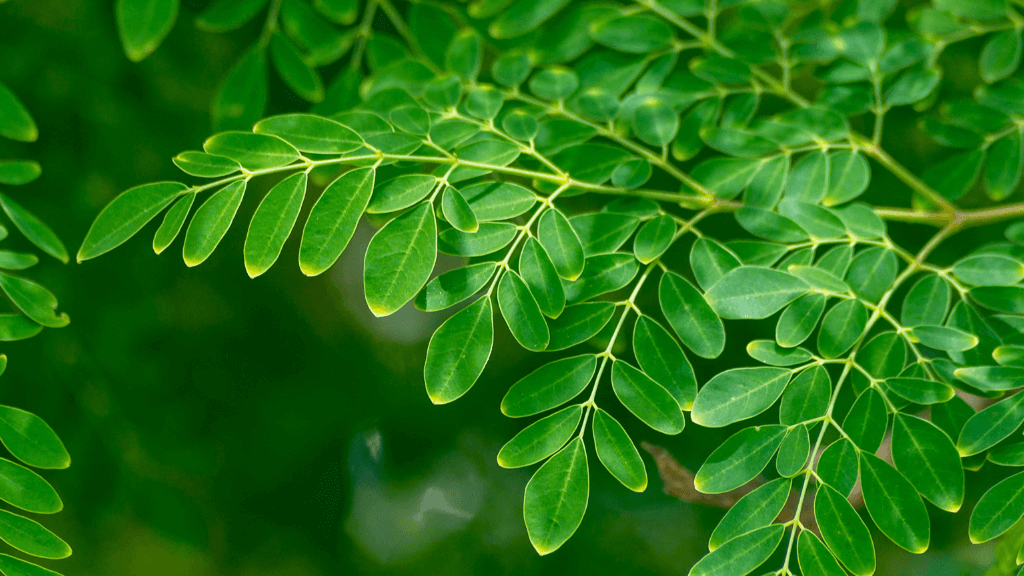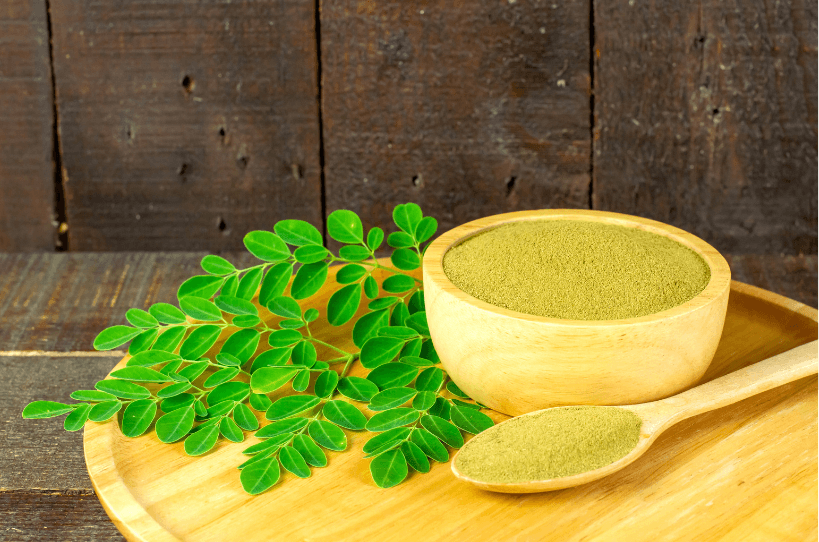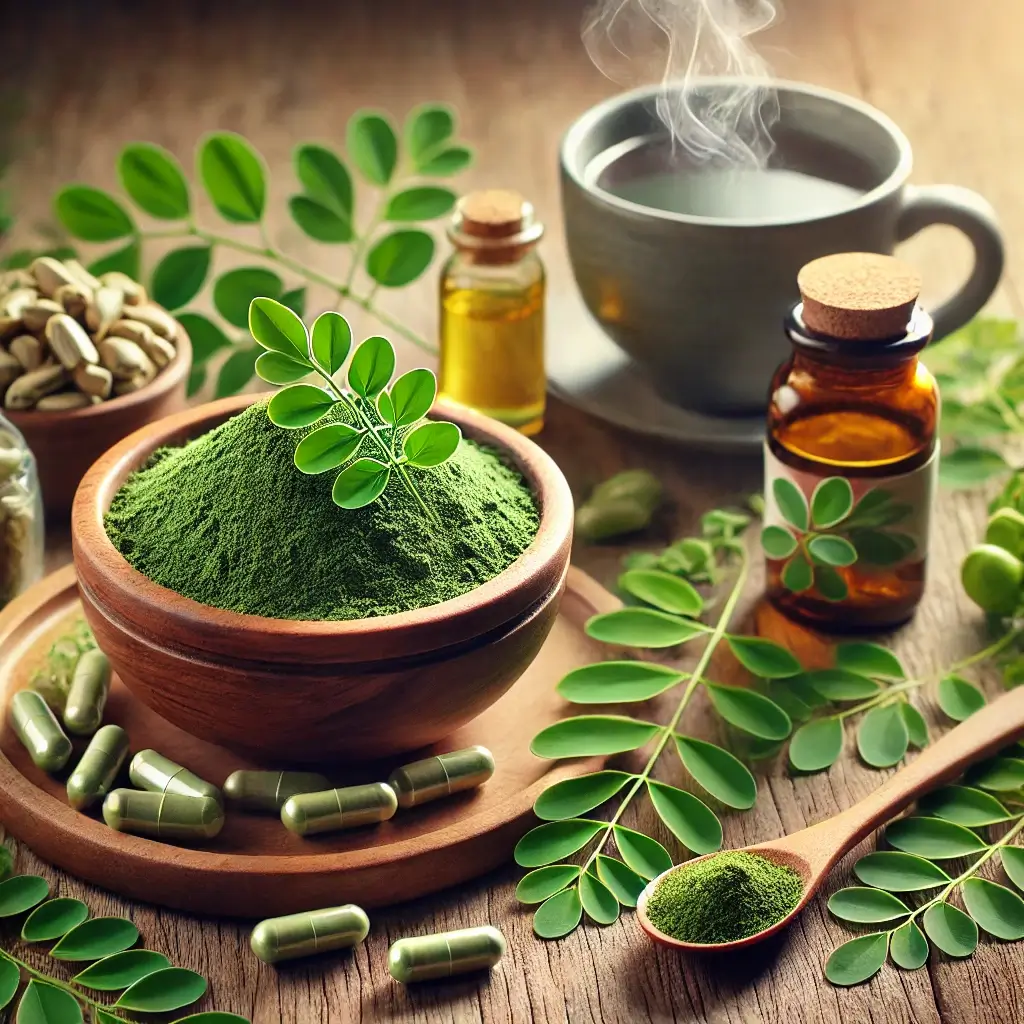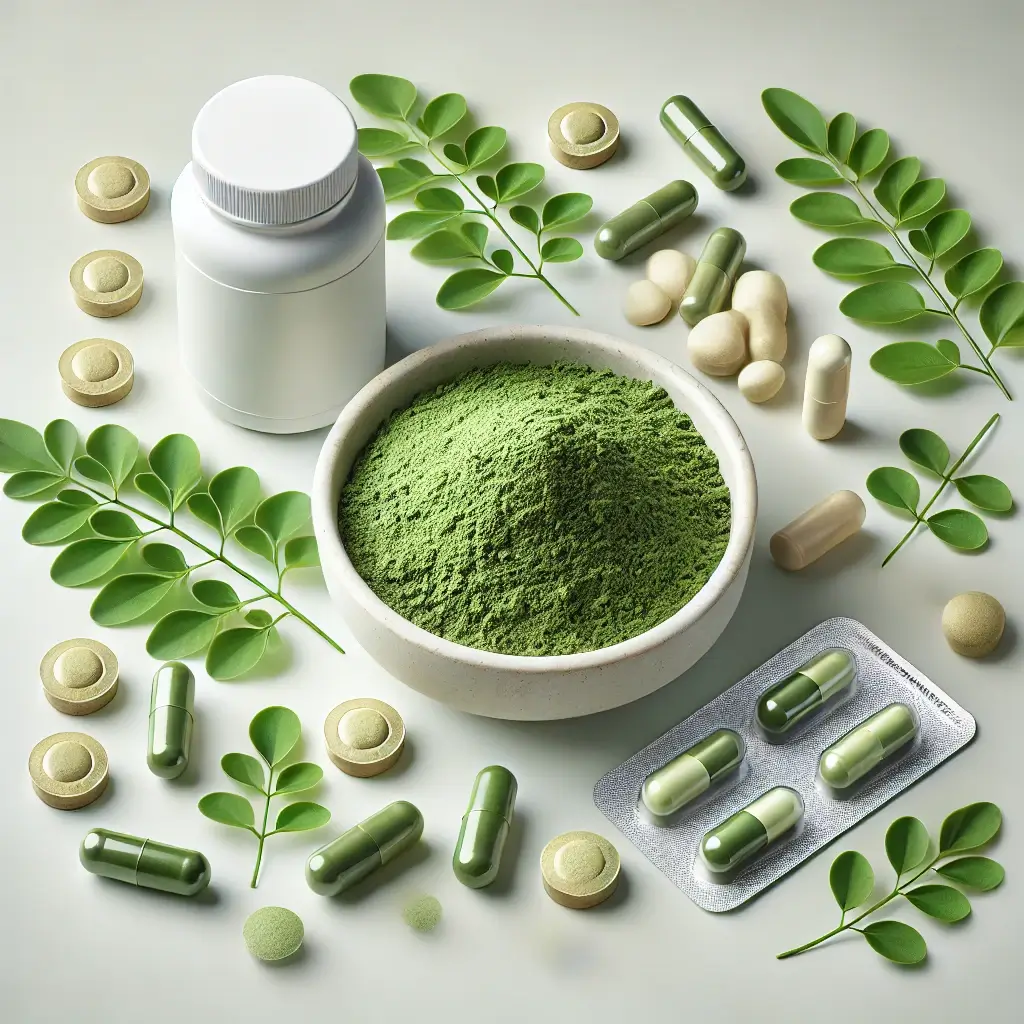
Moringa, often called the “miracle tree” or “drumstick tree,” has earned its reputation as a super food due to its impressive range of health benefits and nutritional value. Native to India and parts of Africa, Moringa has been used for centuries in traditional medicine for its powerful therapeutic properties. Today, it is gaining widespread popularity globally as an accessible and effective natural supplement that provides essential nutrients and health benefits. Let’s explore the various benefits of Moringa, explain its nutritional significance, and highlight why Moringa supplements can be a vital addition to your wellness routine.
WHAT IS MORINGA?
Moringa, scientifically known as Moringa oleifera, is a fast-growing, drought-resistant tree that belongs to the family Moringaceae. Moringa is also called the “horseradish tree” because its roots taste like horseradish. In the Philippines, it’s known as “malunggay.” India is the largest producer of Moringa. Every part of the plant—from the leaves and seeds to the flowers and bark—has nutritional or medicinal properties. Moringa is a nutritional powerhouse that contains high levels of vitamins, minerals, amino acids, antioxidants, and anti-inflammatory compounds, making it one of the most nutrient-dense plants available.
NUTRITIONAL COMPOSITION OF MORINGA
Moringa oleifera is famous for its nutritional value. Its leaves are rich in a wide range of essential nutrients like:
- Vitamins: Moringa contains vitamins A, C, E, and B-complex, which support immune health, skin, and overall vitality.
- Minerals: It is a source of minerals such as calcium, magnesium, iron, potassium, and zinc.
- Amino Acids: Moringa provides all nine essential amino acids, making it a complete protein source. The leaves have about 30% protein by dry weight. This makes them a great source of plant-based protein. So, moringa is great for vegetarians/vegans and anyone who wants more protein from plants.
- Antioxidants: Moringa contains powerful antioxidants such as quercetin, chlorogenic acid, and beta-carotene.
- Phytonutrients: It also contains phytonutrients like glucosinolates, which have shown anti-cancer properties in studies.

FORMS OF MORINGA SUPPLEMENTS
It’s easy to use Moringa in various supplement forms like powders, capsules, oils, and teas. This makes it a convenient way to improve your health and feel better.
Each form offers its unique advantages:
- Powder: Made from dried Moringa leaves, it can be easily added to smoothies, juices, or food.
- Capsules: These provide a convenient way to consume Moringa without the need to mix or prepare it.
- Oil: Extracted from Moringa seeds, the oil is often used topically for skin and hair.
- Tea: Moringa tea is a mild, flavorful way to enjoy the benefits of Moringa while hydrating.

BENEFITS
1. Rich in Antioxidants
One of the key benefits of Moringa is its high antioxidant content. Antioxidants are compounds that help neutralize free radicals, which are unstable molecules that can damage cells and contribute to aging and disease. Moringa is packed with antioxidants such as quercetin, chlorogenic acid, and beta-carotene, which help reduce oxidative stress and inflammation.
- Quercetin: Known for its anti-inflammatory and antihistamine properties, quercetin is beneficial for heart health and immune support.
- Chlorogenic Acid: This antioxidant helps in reducing blood sugar levels and can improve energy metabolism.
2. Supports Immune Health
The high vitamin C and antioxidant content in Moringa make it a powerful immune booster. Vitamin C is crucial for a healthy immune response, helping the body to combat infections and illnesses more effectively. Additionally, Moringa contains a natural source of zinc, which is essential for the development and function of immune cells.
3. Promotes Heart Health
Studies have shown that Moringa can have a positive effect on cardiovascular health. It helps lower cholesterol levels, reduces inflammation, and improves blood flow. The antioxidants in Moringa, particularly quercetin, play a role in reducing the risk of heart disease by preventing oxidative stress in the cardiovascular system.
- Lowers Blood Pressure: Moringa contains compounds that act as natural vasodilators, helping to relax the blood vessels and reduce blood pressure.
- Reduces Cholesterol: Research has indicated that Moringa can help lower LDL cholesterol levels, which are a significant risk factor for heart disease.
4. Helps Regulate Blood Sugar Levels
Moringa may offer benefits for blood sugar control, making it beneficial for individuals with diabetes or those at risk of developing diabetes. The chlorogenic acid and isothiocyanates found in Moringa leaves help reduce blood sugar spikes and improve insulin sensitivity.
- Improves Insulin Sensitivity: Regular consumption of Moringa has shown to enhance the body’s response to insulin, which is crucial for maintaining stable blood sugar levels.
- Reduces Blood Sugar Spikes: Some studies indicate that Moringa can prevent post-meal spikes in blood sugar, helping to stabilize energy and prevent sugar crashes.
5. Anti-Inflammatory Properties
Chronic inflammation is a contributing factor to many health conditions, including heart disease, diabetes, arthritis, and even cancer. Moringa’s anti-inflammatory properties come from its high antioxidant content as well as compounds like isothiocyanates, which have shown to reduce inflammation effectively.
6. Supports Digestive Health
Moringa contains a substantial amount of fiber, which is essential for digestive health. Fiber promotes regular bowel movements, prevents constipation, and helps to remove toxins from the digestive tract. The high fiber content in Moringa also supports a healthy gut microbiome, which is essential for immune function and nutrient absorption.
7. Promotes Skin and Hair Health
Moringa is packed with vitamins and minerals that nourish skin and hair from within. Its vitamin A and E content supports skin health by promoting collagen production, which helps in keeping the skin firm and youthful. Moringa oil, extracted from its seeds, is a popular ingredient in skincare products due to its moisturizing and anti-aging properties.
- Protects Against Acne and Blemishes: Moringa’s anti-inflammatory properties may help reduce acne and other skin irritations.
- Promotes Hair Growth: The presence of zinc and other essential nutrients in Moringa can strengthen hair and prevent hair loss.
8. Enhances Brain Health
Moringa’s antioxidant properties may also benefit brain health by reducing oxidative stress, which can contribute to neurological disorders. The vitamin E and C content in Moringa supports cognitive function and protects the brain from degeneration associated with aging. Some studies suggest that Moringa’s anti-inflammatory effects may be beneficial in managing symptoms of depression and anxiety.
- Protects Against Neurodegenerative Diseases: Regular consumption of Moringa may reduce the risk of conditions like Alzheimer’s and Parkinson’s.
- Improves Mood and Memory: The amino acids in Moringa help in the production of neurotransmitters like serotonin, which is vital for mood regulation and memory function.
9. Supports Bone Health
Moringa is a good source of calcium and phosphorus, two essential minerals for bone health. Calcium is necessary for maintaining bone density and strength, while phosphorus plays a role in the formation of bones and teeth. Additionally, Moringa’s anti-inflammatory properties may help alleviate symptoms of bone-related conditions like arthritis.
- Increases Bone Density: Regular intake of Moringa can contribute to stronger bones and a lower risk of fractures.
- Helps Prevent Osteoporosis: The calcium and vitamin K content in Moringa may help prevent bone loss associated with aging.
10. Detoxifying Properties
Moringa is often used in traditional medicine as a natural detoxifier. Its high antioxidant and fiber content help cleanse the body of toxins, support liver function, and promote a healthy metabolism. The chlorophyll in Moringa is particularly beneficial for liver health, as it assists in breaking down and removing toxins from the blood.
COMMON SIDE EFFECTS ACROSS ALL FORMS (supplements, powder, oils, teas)
- Digestive Issues: Overconsumption of moringa in any form can lead to nausea, diarrhea, or stomach upset due to its high fiber and potent compounds.
- Hypoglycemia and Hypotension: Both supplements and other forms of moringa can lower blood sugar and blood pressure, which is beneficial for some but potentially harmful for individuals on medication for these conditions.
- Allergic Reactions: Allergies to moringa can occur regardless of the form, manifesting as itching, rashes, or breathing difficulties.
—Specific to Supplements
- Concentrated Dosages: Moringa supplements, being more concentrated, may pose a higher risk of side effects like liver stress or over-supplementation of certain nutrients if taken in excessive amounts.
- Additives or Contaminants: Supplements might include fillers or contaminants, so quality and sourcing matter more than with raw forms.
—Specific to Fresh or Cooked Forms
- Root and Bark Concerns: Consuming raw root or bark may introduce toxic compounds like spirochin, which can affect the nervous system or cause uterine contractions.
- Nutritional Variability: The nutritional content varies more widely in fresh or cooked forms depending on how they’re prepared, potentially altering their effects.
PRECAUTIONS
- Pregnancy and Breastfeeding: Avoid the root and bark in all forms due to their potential to cause uterine contractions. Moringa leaf products (fresh, powdered, or as a supplement) are safer but should still be used cautiously.
- Interactions with Medications: Whether in supplement or raw form, moringa can interact with medications for diabetes, hypertension, or thyroid issues, necessitating medical consultation before use.

WHY MORINGA SUPPLEMENTS ARE IMPORTANT?
While Moringa offers an extensive list of health benefits, it can be challenging to consume enough Moringa through diet alone, especially in regions where fresh Moringa leaves are not readily available. Here’s why Moringa supplements can be an effective solution:
- Convenience: Moringa supplements, available in capsules or powders, offer a convenient way to consume this nutrient-dense plant daily.
- Higher Potency: Moringa supplements are often concentrated, meaning you get a higher potency of nutrients compared to fresh leaves.
- Consistent Dosage: Supplements allow for a more consistent dosage of Moringa, making it easier to monitor your intake and receive optimal benefits.
- Bioavailability: Some supplements are designed to enhance bioavailability, meaning your body can absorb and utilize the nutrients more effectively.
- Accessibility: For those who cannot access fresh Moringa leaves, supplements offer a viable alternative.
CHOOSING THE RIGHT MORINGA SUPPLEMENT
When selecting a Moringa supplement, it’s essential to look for high-quality, organic products to ensure purity and avoid contaminants. Here are some tips to consider:
- Opt for Organic: Organic Moringa supplements are free from pesticides and chemicals, ensuring you get a clean product.
- Check the Source: Moringa from reputable sources, particularly those grown in nutrient-rich soils, is likely to have higher nutrient content.
- Read the Label: Look for pure Moringa supplements without unnecessary fillers or additives.
- Quality Concerns: Choose reputable brands of moringa supplements to avoid contamination or excessive levels of active compounds.
- Additives or Contaminants: Supplements might include fillers or contaminants, so quality and sourcing matter more than with raw forms.
Dosage and Safety
The recommended dosage for Moringa varies depending on the form and concentration. It’s generally safe to consume Moringa daily, but it’s essential to follow the recommended guidelines on the supplement’s label or consult a healthcare professional for personalized advice.
MORINGA: MORE THAN A TRENDY SUPERFOOD
Moringa is far more than a trendy superfood; it is a powerful solution to global nutritional challenges. Packed with essential nutrients such as vitamins A, C, and E, calcium, potassium, and a rich array of antioxidants, moringa offers significant health benefits for both developing and developed nations. Its resilience in arid climates and ability to thrive with minimal water make it a vital resource for food security in regions where malnutrition and food shortages are common. With deep roots that access water unavailable to other plants, moringa is uniquely suited to combat the challenges posed by climate change. In developed nations, its versatility as a sustainable, nutrient-dense supplement supports modern dietary needs, addressing deficiencies and promoting overall wellness. By bridging the gap between sustainability and nutrition, moringa’s role in global health underscores its enduring value far beyond mere hype.


